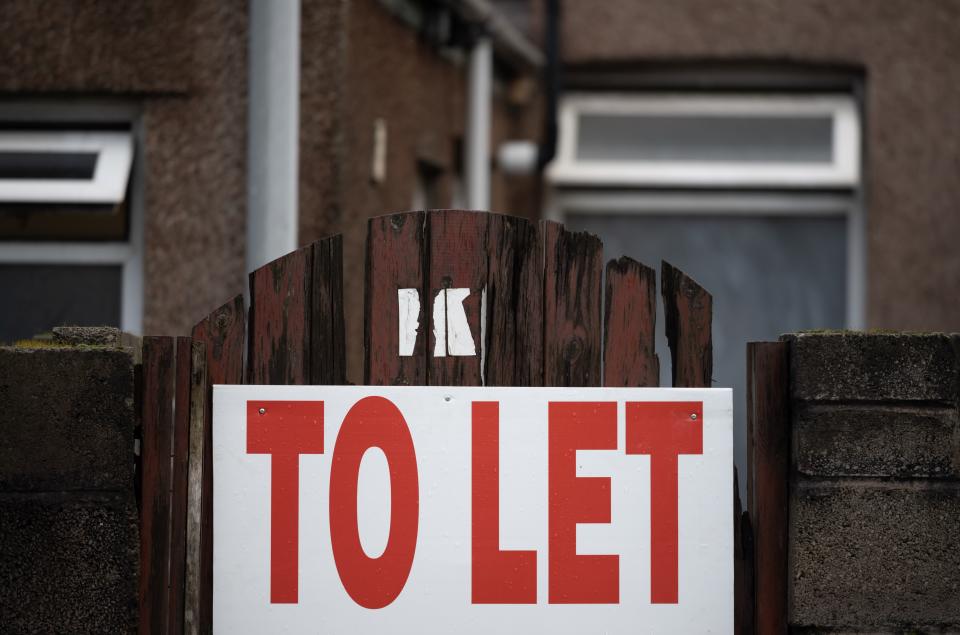Spike in tenants not paying rent as coronavirus hits jobs and pay

A growing number of private tenants are struggling to pay their rent as job losses mount and household incomes take a hit from the coronavirus in the UK.
A poll by the Royal Institute of Chartered Surveyors (RICS) this week lays bare the strain on many renters’ and landlords’ finances, as a public health emergency spirals into an economic crisis.
More than one in 10 surveyors and letting agents who commented said tenants had stopped paying or could not afford their rent, analysis by Yahoo Finance UK shows.
Charities and think tanks warn renters will fall into debt or face eviction without fresh support, despite a string of new government policies aimed at shielding them from hardship.
Landlords also fear for their incomes, and claim official announcements on mortgage holidays may have worsened matters as some tenants believe they no longer have to pay rent.
‘Biggest number of defaults in 30 years’
With the UK economy hobbled by the virus and lockdown, firms have slashed staff and all the evidence suggests unemployment is soaring. Millions of employees may also be ‘furloughed’ on reduced pay, while many self-employed workers have seen their earnings dry up.
Now the hit to the labour market is rippling through the housing market. Eight letting agent and surveyor firms spread across England and Wales, from London to Lincolnshire to Yorkshire, highlighted current or potential rent arrears among multiple tenants in RICS’ latest poll.
Several said tenants have already missed payments. Richard Gallimore, managing partner at Franklin Gallimore estate agent in Tenbury Wells, Worcestershire, said he had seen the biggest number of defaults in 30 years.
One surveyor warned the hit to tenants’ incomes had caused “carnage,” while another said they were “just waiting for the rental arrears fallout” from COVID-19.
Read more: Firms slash hiring at fastest pace since 2009
“Landlords are having to accept no rent from tenants who have lost their jobs,” said Jeremy Dell, an estate agent and chartered surveyor in Oswestry, Shropshire.
12% of RICS members who left comments flagged up rent issues, though the number affected could be higher. Members were not explicitly asked about arrears, and did not have to provide such additional remarks when filling out the survey.
The sample size is small, with only 64 of the 280 RICS members who responded leaving any comments. But with limited national data on rent arrears available, it provides one of the clearest indications yet of the scale of the pandemic’s impact on the private rental sector.
Renters at risk versus ‘well-protected’ homeowners

Further evidence came from Shelter and the Resolution Foundation this week.
The housing charity’s chief executive Polly Neate said it was receiving calls every day from tenants “frantic about how they’ll pay the rent, keep the lights on and put food in the fridge.” She warned hundreds of thousands could fall into debt.
Shelter did not release figures, but demand for its advice linked to the coronavirus is said to be “unprecedented.” It has published comprehensive guidance on its website.
Read more: Calls for stamp duty holiday with UK property market in ‘freefall’
Whatever the number affected so far, renters appear at much greater risk than homeowners as the crisis drags on. Housing eats up 31% of the average private renter’s income, compared with 13% for the average homeowner, according to Resolution Foundation research on Thursday.
“While many homeowners are relatively well-protected....via low interest rates and mortgage holiday options, private renters are exposed to rent arrears and even evictions should they lose their jobs,” said Lindsay Judge, an analyst at the think tank.
‘Unprecedented action’ to help renters
The government has tried to hand renters a lifeline. A housing ministry spokesperson has highlighted its “unprecedented action,” including a 90-day ban on new eviction proceedings, a £1bn top-up for universal credit and local housing allowances and £500m for council hardship funds. Income subsidy schemes may also protect 80% of earnings for millions of workers.
If tenants cannot pay, landlords can seek temporary mortgage holidays and should “work together” with tenants to establish repayment plans.
Deep concerns remain among renters, landlords and charities alike, however.
Read more: UK workers ‘left with nothing’ by small print of coronavirus support schemes
Northern Ireland’s student union body says some landlords “aren’t getting the memo,” and student reps across the UK want a three-month rent holiday. Many are frustrated they cannot escape hefty rents on empty university accommodation, despite being sent home.
Some students and workers in shared homes despair at having to pay full rent even when some tenants are jobless and cannot contribute.
The National Residential Landlords Association (NRLA) agrees landlords should be flexible and says many are, but warns they too will struggle. “The vast majority of landlords are individuals and many rely on the rent for their livelihoods,” Chris Norris, its policy director, told Yahoo Finance UK.
‘Tenants think they can just stop paying rent’
The NRLA also says a new headache is growing numbers of tenants believing the holidays mean they can simply stop paying their rent. It says not all landlords have mortgages, holidays are applied for under strict rules rather than automatic, and missed payments must eventually be made up.
“The government has been clear that tenants should continue to pay rent where they are able,” added Norris.
If rent arrears become mortgage arrears beyond approved holidays, the problem moves up the chain to lenders. If widespread it even risks “seizing up” part of the financial system, as the Economist magazine noted of the US.
Questions are growing over the temporary eviction ban too. One Labour MP claims new evictions are happening in some areas, and at a record rates. Shelter fears it simply paves the way for more evictions once the ban ends.
Meanwhile tenants still face a “significant shortfall” in paying rent after years of benefit cuts, despite new benefit top-ups, according to the Resolution Foundation. The think tank and Shelter both want a controversial benefit cap lifted.
But with an enormous corporate bailout underway and countless other calls on its resources, the government is hoping tenants, landlords and perhaps banks can largely sort it out among themselves.

 Yahoo Finance
Yahoo Finance 